Table of Contents
If you’ve ever wondered why some phases of life feel smooth and full of opportunities while others seem more challenging, astrology has an interesting explanation for it—and that’s where Dasha comes in.
In Vedic astrology, what is Dasha in astrology refers to a planetary timeline that shows which planet is influencing your life at a given point. Think of it like cosmic “seasons” that shape your experiences, decisions, and even the kind of people you meet. Just like weather seasons change the vibe of the year, Dashas shift the overall theme of your life.
For beginners, the concept might sound a little complex, but don’t worry—we’ll break it down step by step. In this guide, you’ll learn what Dashas are, the different types, how they impact life events, and even how to calculate your current Dasha. By the end, you’ll see why astrologers place so much importance on them when predicting life patterns.
Introduction to Dasha in Astrology
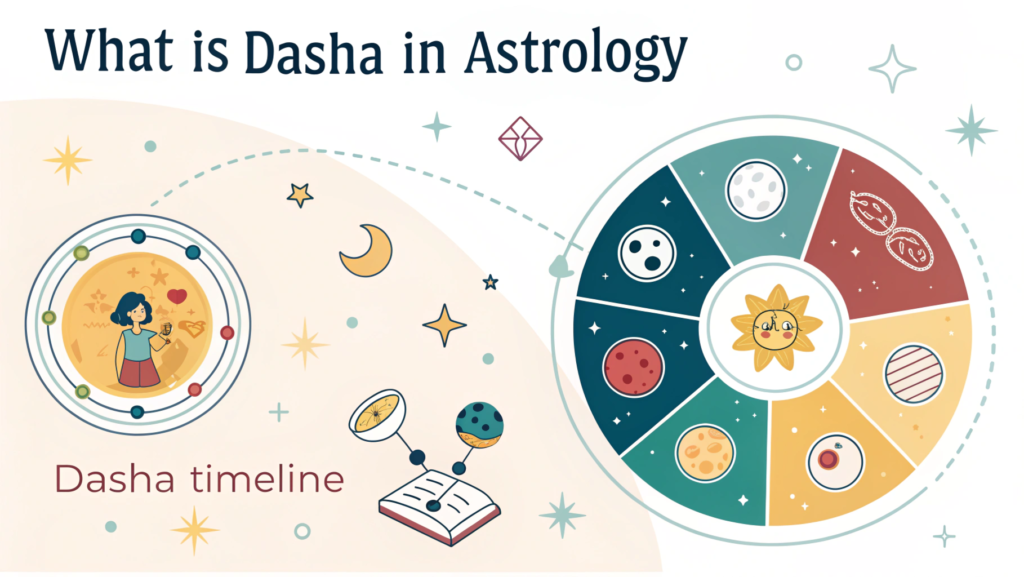
In simple words, Dasha in astrology is like a timeline that tells us which planet is “in charge” of our life during a particular period. Instead of every planet affecting us equally all the time, Vedic astrology says that each one gets its own turn to play the lead role. When that planet is ruling, its energy—good or challenging—becomes more noticeable in our daily life.
For example, if you are going through a Venus Dasha, you may find themes related to love, beauty, comfort, and relationships becoming more important. On the other hand, if it’s a Saturn Dasha, life might push you to focus on discipline, hard work, and responsibilities.
Understanding Dashas helps us make sense of why certain life events happen when they do, and it also shows how the bigger picture of our journey is unfolding.
If you’re completely new to astrology and want to start from the basics, you might want to check out our guide on Astrology for Beginners . It will give you a solid foundation before diving deeper into Dashas.
Types of Dashas in Vedic Astrology
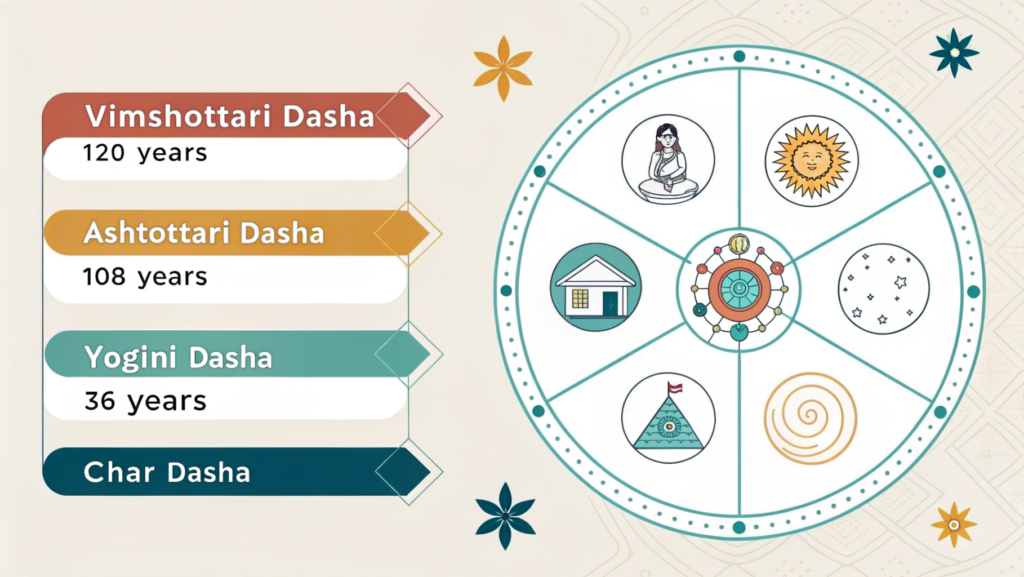
In Vedic astrology, there isn’t just one type of Dasha—there are several systems that astrologers use to study how planets influence your life. But don’t worry, you don’t need to learn all of them right away. Let’s look at the most commonly used ones:
1. Vimshottari Dasha
This is the most popular and widely used Dasha system. It divides human life into 120 years, where each planet gets a specific number of years to rule. For example, the Sun rules for 6 years, Jupiter for 16 years, and Venus for 20 years. Most predictions you’ll hear from astrologers are based on Vimshottari Dasha.
2. Ashtottari Dasha
This system works on a cycle of 108 years. It’s used in specific horoscopes where certain planetary conditions are present. While not as commonly applied as Vimshottari, it still has an important role in Vedic studies.
3. Yogini Dasha
Yogini Dasha runs for 36 years and is divided among eight Yoginis (symbolic female energies). Each Yogini has its own ruling planet and influence. Some astrologers use it alongside Vimshottari Dasha for deeper insights.
4. Char Dasha
Unlike the others, Char Dasha is based on zodiac signs rather than planets. It focuses on the movement of signs and is often used to study a person’s career, growth, and major turning points.
Among all these, Vimshottari Dasha is the one beginners should focus on first, because it’s the foundation for most Dasha readings. Once you’re comfortable with that, you can explore the others for more advanced understanding.
How Dashas Influence Life Events
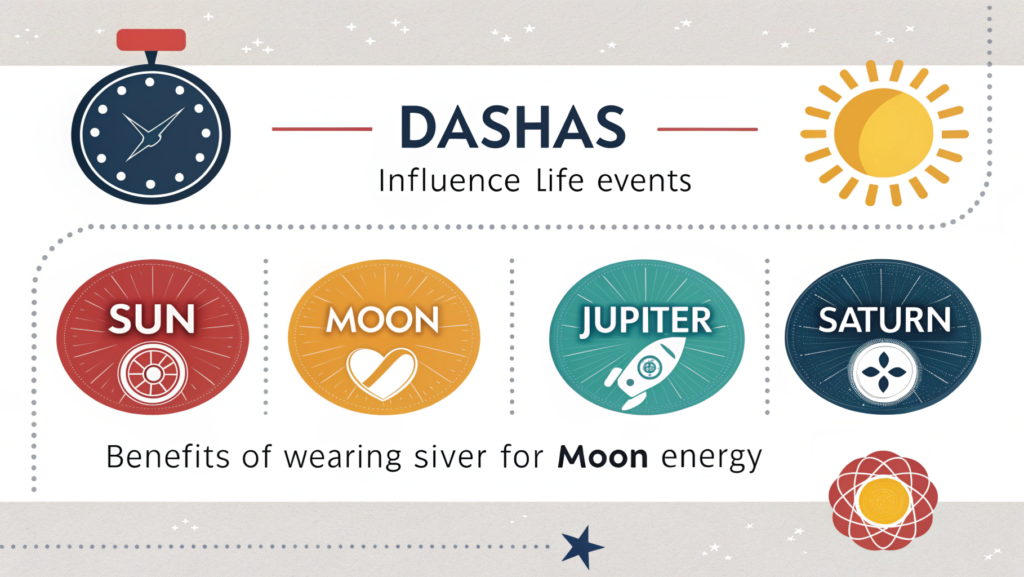
Dashas are like different chapters of your life story—each one has its own theme, lessons, and experiences. When a planet is ruling your Dasha, its qualities become more active, and you start to notice changes in different areas of life such as career, health, relationships, or personal growth.
For example:
- Sun Dasha often highlights leadership, confidence, authority, and sometimes ego struggles.
- Moon Dasha can bring focus on emotions, family life, and inner peace (or emotional ups and downs).
- Jupiter Dasha usually feels like a growth period—education, wisdom, and opportunities may expand.
- Saturn Dasha is known for teaching discipline, patience, and responsibility, though it may feel heavy at times.
These planetary “seasons” don’t control your life completely, but they set the overall tone. Just like the weather—summer makes you feel energetic and outdoorsy, while winter makes you slow down—Dashas create the backdrop for your life experiences.
This is why astrologers often look at your current Dasha before making predictions. It helps them understand why certain things are happening now and what kind of themes you can expect in the near future.
Mahadasha and Antardasha Explained
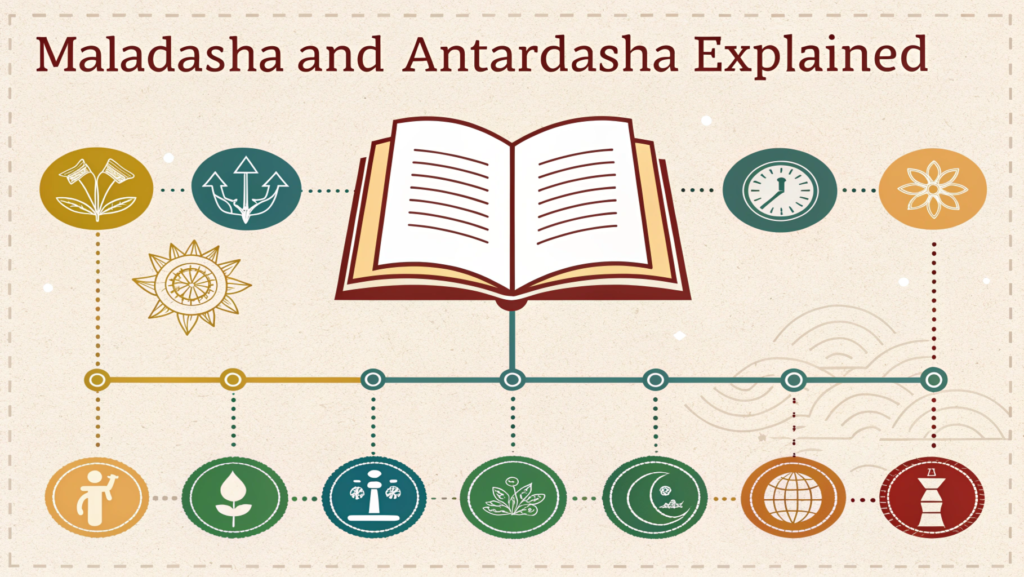
When people talk about Dashas, you’ll often hear two terms together—Mahadasha and Antardasha. Think of them as the “big chapter” and the “sub-chapter” of your life story.
- Mahadasha (Major Dasha):
This is the main planetary period. It lasts for several years (depending on which planet is ruling). For example, a Venus Mahadasha runs for 20 years, while a Saturn Mahadasha runs for 19 years. During this time, that planet sets the overall theme of your life. - Antardasha (Sub-Dasha):
Inside every Mahadasha, there are smaller planetary periods called Antardashas. These work like mini-chapters within the big chapter. For example, if you are in a Venus Mahadasha but currently in a Saturn Antardasha, then both Venus and Saturn will influence your life together—the “flavor” of Venus mixed with Saturn’s lessons.
An easy way to understand this:
Imagine your life is like a movie.
- The Mahadasha is the movie’s main genre (romance, action, drama, etc.).
- The Antardasha is like a particular scene that adds detail and direction to the story.
This combination of Mahadasha and Antardasha is what makes astrology so detailed. It’s not just one planet at play—it’s how planets interact with each other during different timelines.
How to Calculate Your Current Dasha
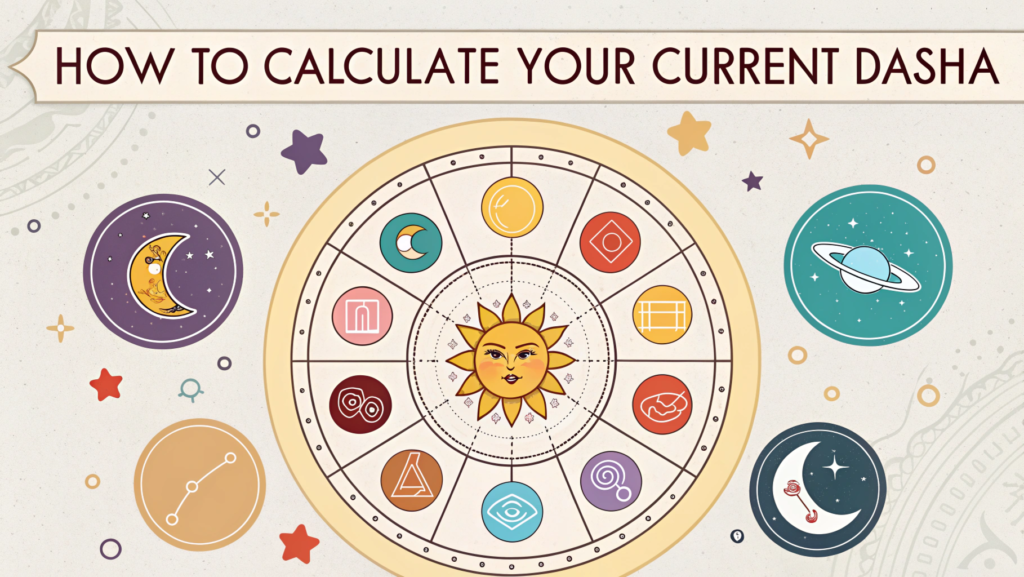
Now that you know what Dashas are, the next big question is—“How do I find out which Dasha I’m in right now?”
The calculation is based on your birth chart (kundli). Specifically, it depends on the exact position of the Moon at the time of your birth. That position decides which planet’s Mahadasha you start with and how many years of that planet are left at the beginning of your life.
Here’s the simple way to get your current Dasha:
- Know your birth details – You’ll need your date, time, and place of birth.
- Generate your horoscope online – There are plenty of free astrology websites and apps where you can enter your details. They will automatically show your Mahadasha and Antardasha periods.
- Check your running Dasha – The chart will tell you which planet is currently ruling your Mahadasha (major period) and which planet is ruling the Antardasha (sub-period).
- Understand the timeline – It will also show when this Dasha started and when it will end, so you can see the upcoming changes.
For example, let’s say your chart shows you’re in Moon Mahadasha with Jupiter Antardasha. That means overall Moon’s energy (emotions, family, peace) is active in your life right now, but Jupiter (growth, wisdom, education) is adding its flavor during this sub-period.
So, while the exact math behind Dasha calculation can get pretty technical, beginners don’t need to worry about crunching numbers—online tools or an astrologer can easily do it for you. The key is knowing what those results mean for your life.
Common Misconceptions About Dashas
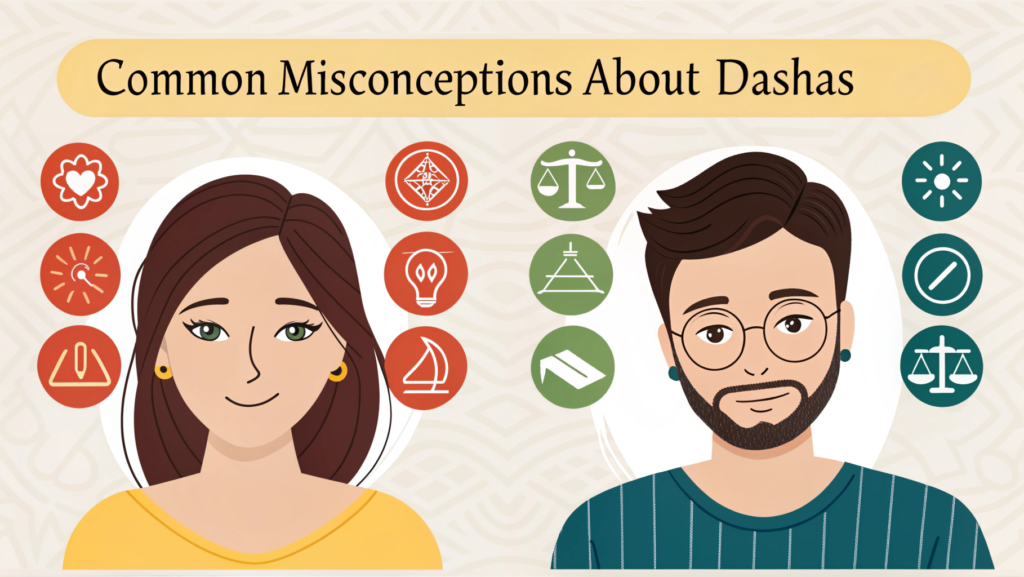
Since Dashas deal with life events and timing, it’s easy for people to get confused or even scared about them. Let’s clear up some of the most common myths:
Misconception 1: “Dashas decide everything in life.”
Not true. Dashas set the overall theme of a period, but your actions, decisions, and free will still play a huge role. Think of it like the weather—you can’t change if it’s raining, but you can always carry an umbrella.
Misconception 2: “All Dashas of ‘tough planets’ are bad.”
Planets like Saturn, Rahu, or Ketu often get a bad reputation. But their Dashas are not only about struggles—they also bring growth, maturity, and important life lessons. For example, Saturn may slow things down but teaches discipline and long-term success.
Misconception 3: “Good planets only bring happiness.”
Even so-called “benefic” planets like Jupiter or Venus can bring challenges. A Jupiter Dasha might expand opportunities, but it can also make you overconfident. Venus may bring love and comfort, but it can also create distractions. Balance is key.
Misconception 4: “Everyone experiences Dashas in the same way.”
Nope! The effect of a Dasha depends on your unique birth chart. Two people in the same Venus Dasha can have completely different experiences depending on how Venus is placed in their horoscope.
The takeaway: Dashas don’t “control” you—they guide you. Understanding them helps you align better with life’s natural flow instead of feeling stuck or fearful.
Conclusion
Dashas are like life’s cosmic calendar—each planet gets its turn to guide your journey, bringing its own lessons, challenges, and blessings. By understanding Mahadasha and Antardasha, you get a clearer picture of why certain phases feel the way they do and what themes are likely to show up in your life.
The key thing to remember is that Dashas don’t control you—they simply set the backdrop. Your choices, mindset, and actions still shape the outcome. When you see Dashas this way, they become less about fear and more about awareness, helping you move through life with clarity and confidence.
Discover Your Clarity
Move from reading about spiritual guidance to receiving it. We offer a full range of services to support you, from Tarot readings to professional courses.
View All Services
Swetta S Maheshwari
A passionate Tarot Reader, Astrologer, Numerologist, Akashic Records Reader, and Healer with over 5 years of experience guiding people toward clarity, healing, and transformation. Through my work, I blend ancient wisdom with intuitive insights to help individuals uncover their life’s purpose, overcome challenges, and align with their true potential. My mission is to be a guiding light for those seeking answers, empowerment, and spiritual growth.